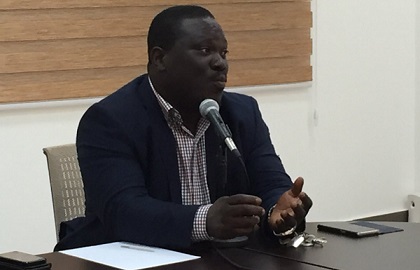
Use 2019 budget to reduce size of govt — Economist
An economist and senior lecturer at the Economics Department of the University of Ghana, Dr Ebo Turkson, has said the 2019 budget must announce plans to reduce the size of government as part of efforts to rein in public expenditure.
After two years in office, Dr Turkson said, the time had come for the government to admit that some of the new ministries could be merged and others subsumed under the presidency.
The reduction in size and numbers, he said, should be extended to the list of presidential staffers, which was last reported at 998 as of the end of 2017. There were also 110 ministers and deputies.
He told the GRAPHIC BUSINESS ahead of the presentation of the 2019 budget that the reduction in the size of government was needed to reduce the amount used as compensation for such employees.
It would also ease the pressure on the fiscal deficit, which overshot its target of 3.3 per cent of gross domestic product (GDP) in the first seven months of the year to 3.8 per cent of GDP.
Last year, the public wage bill rose to GH¢14.4 billion and is now estimated to end this year at GH¢16.8 billion.
Impact on economy
In the November 5 interview, Dr Turkson was optimistic that a credible reduction in employee compensation would free money for investment in productive sectors, leading to expansion in the economy.
“They have been in power for two years and I think this is the time for them to start expanding the economy with some of the initiatives that they have taken in the past.
“In doing that, one thing that you want to take a look at is the size of the government machinery in terms of ministers and deputy ministers.
“By now I think the President should be aware that some of the ministries he formed should be subsumed under other ministries that seem to be up and doing,” he said.
Ministries to consider
Asked which ministries should be considered for possible scrapping, Dr Turkson mentioned for instance, the ministries of Procurement and Monitoring and Evaluation.
“These ministries can find themselves under the Presidency, so that we can reduce the expenditure,” he said.
He explained that although reducing the size of the government was not a budget item, it could use the presentation to announce plans to cut public expenditure and later implement it through the scrapping and realignment of ministries and roles in government.
Special projects
Dr Turkson said he also expected the 2019 budget to continue with the government’s pro-growth policies by making the private sector the focal point of all initiatives.
He added that he also expected special programmes such as the One District, One Factory (1D1F) and the Nation Builders Corps (NaBCO) to kick in and translate into economic growth.
“I also expect the government to increase investment in education, especially tertiary education. This is because in two to three years’ time you will expect the backlog of free senior high school (SHS) students to enter tertiary institutions,” he said.
Beyond planning for SHS graduates, he said, the government needed to invest in infrastructure development in SHSs to help sustain the free SHS programme.
Already, the Ghana Education Trust Fund (GETFund) has finalised plans to borrow some US$1.5 billion from a consortium of financial institutions to be used to fund the construction and completion of basic schools and vocational and technical training centres.
The loan is to be backed by a portion of GETFund allocations. A paper on the debt has since been laid before Parliament for consideration and subsequent approval.
Huge infrastructure
Dr Turkson added that he expected the government to start massive infrastructure development next year, having succeeded in stabilising the economy.
He mentioned roads and railways as some key infrastructure needed to expand the economy and create jobs.
He also underscored the need for the government to address the challenges facing businesses in order to create a conducive environment that could stimulate and sustain growth.